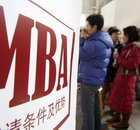Global General
Climate conference emits its share of carbon
(Agencies)
Updated: 2009-12-16 10:12
 |
Large Medium Small |
|
|
COPENHAGEN: If they fail to reach a climate deal in Copenhagen, world leaders flying in their private jets and huddling in five-star hotels will have little to show for their efforts beyond a big, fat carbon footprint.
The UN estimates 40,500 tons of carbon dioxide will be pumped into the atmosphere during the 12-day conference, 90 percent of it from flights. The rest comes from waste and electricity related to transport to and from the conference center and lodging in and around the Danish city.
Most of the leaders were flying either on commercial airlines or government-owned jets and Sweden was one of the few to announce plans to offset those aviation emissions, something it does routinely. Most are doing nothing to boost their green credentials and some saw no reason to treat their trip to the UN climate talks any differently.
Those traveling on commercial flights include Thai Prime Minister Abhisit Vejajjiva, Austrian Chancellor Werner Faymann and Finnish President Tarja Halonen.
US President Barack Obama is traveling on Air Force One, French President Nicolas Sarkozy in his special Airbus and Brazilian President Luiz Inacio Lula da Silva on a presidential jet nicknamed "Aerolula."
A handful of Europeans made a point of taking the train, like the environment ministers of the Netherlands and Switzerland.
Few environmentalists at the conference made an issue of the carbon footprints from more than 100 world leaders. They were more worried that governments are failing to make progress on reaching a global climate pact.
Norway's Prime Minister Jens Stoltenberg -- who often gives green advice to Norwegians -- was criticized at home, however, for deciding to take a private jet from Oslo to Copenhagen rather than one of the 17 shuttles that daily make the hour-long run between the two Scandinavian capitals.
"If he tells everybody to take the bus, take the train, stop wasting energy, then you'd have to expect Stoltenberg to sacrifice something too," said Oerjan Holm, vice president of the Norwegian Conservation Society.
A statement from Stoltenberg's office said he decided to travel by private jet because he wanted the "flexibility" to match the somewhat unstable schedule of the climate conference. It added that the government buys carbon credits at the end of every year to offset the prime minister's air travels.
Some activists said leaders should at least find ways to make their trip more sustainable, especially if they aren't serious about reaching a deal.
"There is an obsession by world leaders to be able to come in here with big entourages on their special airplanes, land at the airport and be driven in big limousines, with bigger entourages," said Asad Rehman, spokesman for the environmental group Friends of the Earth.
"What they should be looking at is how they could travel here with the minimal carbon impact that they can have," he said. "But also, more importantly, are they coming here to actually sign a deal and make a deal that will save both the people and the planet? If they're coming here with an empty pocket and empty promises, then they should stay at home."
Susan Burns, the chief executive officer of the Global Footprint Network, a California-based sustainability research institute, said it would be wrong to scale back negotiations over concerns about carbon emissions, especially with so much work to be done.
"They should have a Copenhagen every month until they figure this out," Burns said. "We need to spend our carbon very wisely. And getting world leaders together and locking them in a room while they get this done is one such investment, as is investing it in the economy of the future."













